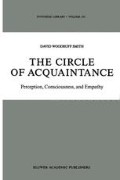Abstract
As an intentional relation, acquaintance depends on content, viz., an indexical content:
A person is acquainted with an object in having an experience if and only if the experience has a certain indexical content and that content in that experience prescribes, or is satisfied by, that object.
Furthermore, by the conditions of satisfaction for that content, the acquaintance depends on the context of the experience:
The indexical content in an acquainting experience prescribes, or is satisfied by, a given object if and only if that object stands in an appropriate contextual relation to the experience.
But acquaintance also depends on context in another way, for:
An acquainting experience normally cannot occur unless the relevant contextual relation holds.
Visual experience, for instance, normally cannot occur unless the object of vision is before the subject and causing the experience. That contextual relationship is thus a normal precondition of the experience. Similarly, inner awareness of one’s current experience, and of oneself, cannot occur unless the awareness is an appropriate part of the experience one is having.
Access this chapter
Tax calculation will be finalised at checkout
Purchases are for personal use only
Preview
Unable to display preview. Download preview PDF.
Notes
See Richard Rorty [1979], Philosophy and the Mirror of Nature, and — more explicit — Patricia Smith Churchland [1983], “Consciousness: the Transmutation of a Concept”. While Rorty’s stance is historicist, Churchland’s is one of eliminative materialism.
Cf. John Searle [1984], Intentionality, Chapter 5, “The Background”. Hubert Dreyfus has argued similarly in lectures and discussion, especially drawing on Merleau-Ponty.
Cf. Martin Heidegger [1928], Being and Time, Division One, chapter III. “The Worldhood of the World”. Hubert Dreyfus’ interpretations of Heidegger, in lectures and discussion, have been very illuminating. Cf. also John Haugeland [1982], “Heidegger on Being a Person”, and lectures by Robert Brandom, both of whom give Heidegger a strong behaviorist and/or pragmatist twist. Here I have distinguished, though, between an individual’s skills (like knowing how to hold a fork) and the practices or customs of his or her culture (like how one is supposed to hold a fork). Skills are very much learned from one’s culture, but the skills are realized in one’s nervous system (as Searle recognizes: cf. note 3) while the practices reside (somehow) in one’s culture. I think there has been a tendency to confuse these two things.
The themes in this section draw on D. W. Smith [1986], “The Ins and Outs of Perception”.
Hilary Putnam [1975], “The Meaning of ‘Meaning’”, p. 220. I’m told Carnap coined the term “methodological solipsism”, though I know not where.
Cf. Smith and McIntyre [1982] and Dreyfus (editor) [1982] on Husserl, and Fodor’s “Methodological Solipsism as a Research Strategy in Cognitive Psychology” in Dreyfus [1982].
This is argued in detail in D. W. Smith [1983], “The (Back)Ground of Experience” (unpublished).
See Cf. Smith and McIntyre [1982] and Dreyfus (editor) [1982] on Husserl, and Fodor’s “Methodological Solipsism as a Research Strategy in Cognitive Psychology” in Dreyfus [1982]..
I’ll draw broadly on well-known themes in Husserl [1905–10], Phenomenology of Internal Time-Consciousness, Edith Stein [1917], On the Problem of Empathy,
Merleau-Ponty [1945], Phenomenology of Perception,
Sartre [1943], Being and Nothingness (Introduction, on “pre-ieflective cogito”).
Bertrand Russell [1948], Human Knowledge: its Scope and Limitations, p. 92.
Colin Wilson [1967], The Mind Parasites.
Daniel Dennett [1978], Brainstorms, “Where am I?”
Similarly, in his [1977], Demonstratives, David Kaplan observed that the sentence “I am here” is analytic but not true necessarily.
Author information
Authors and Affiliations
Rights and permissions
Copyright information
© 1989 Kluwer Academic Publishers
About this chapter
Cite this chapter
Smith, D.W. (1989). Grounds of Acquaintance. In: The Circle of Acquaintance. Synthese Library, vol 205. Springer, Dordrecht. https://doi.org/10.1007/978-94-009-0961-8_7
Download citation
DOI: https://doi.org/10.1007/978-94-009-0961-8_7
Publisher Name: Springer, Dordrecht
Print ISBN: 978-94-010-6922-9
Online ISBN: 978-94-009-0961-8
eBook Packages: Springer Book Archive

